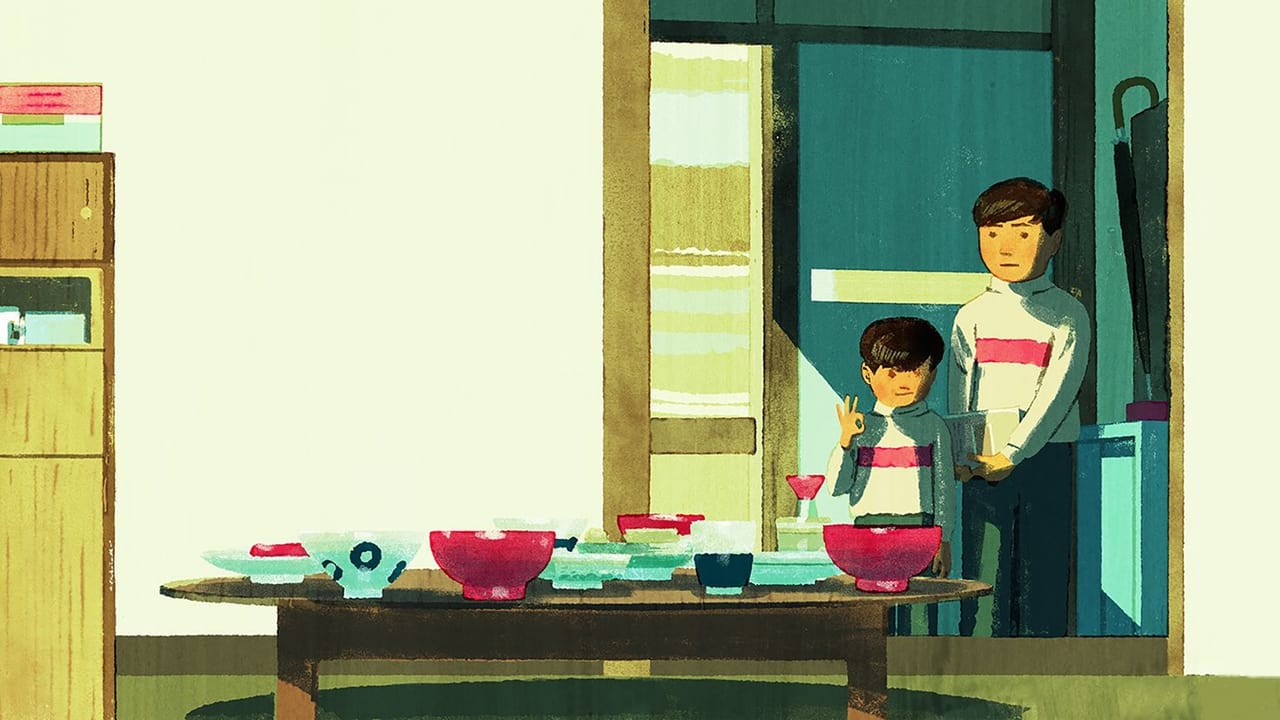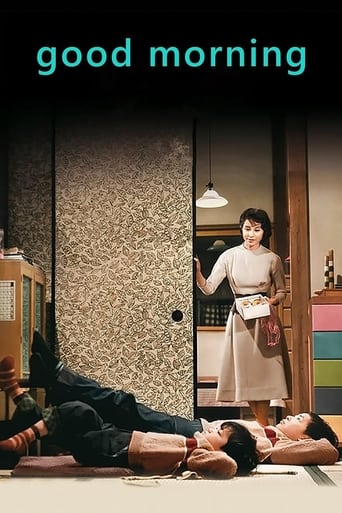Nonureva
Really Surprised!
Chirphymium
It's entirely possible that sending the audience out feeling lousy was intentional
Merolliv
I really wanted to like this movie. I feel terribly cynical trashing it, and that's why I'm giving it a middling 5. Actually, I'm giving it a 5 because there were some superb performances.
Keeley Coleman
The thing I enjoyed most about the film is the fact that it doesn't shy away from being a super-sized-cliche;
MisterWhiplash
I'll start off saying something about Good Morning that will sound like I'm putting it down, but I'm really not: the ingredients of the story (or stories if you want to get technical, there are sort of three running plot-lines here with characters all centered around several houses right below one of Ozu's quintessential small hills), in a lot of other's less imaginative or more hackneyed sensibilities, could have made for a sitcom. The stuff here isn't complicated, and as it starts, it all feels so... simple. All one is doing is seeing... a few kids, two of them brothers, who live ordinary lives, and their parents deal with ordinary problems like... well, did this person pay the dues owed to that other person and did the other woman use that money to get a *washing machine*? Good heavens, the scandal! That's the way I always come to Ozu's films, where it starts off and for at least the first twenty minutes to nearly half an hour, it feels like "nothing" is happening, but that's only because of expectations that come from seeing decades of movies where incident is supposed to happen, drama is supposed to escalate quickly, and those pesky lessons from screen writing classes get jammed down our throats. Good Morning doesn't do that; this is the kind of story where what would seem to be a moment of high dramatic conflict comes when the door-to-door salesman, hocking his wares of rubber bands and pencils (yes, *pencils*), drops by and makes the mother of the two boys a little uncomfortable, saying "We don't need anything." As it turns out, he's probably one of the nicest salesmen in the history of cinema.But I hope you can see what I mean if you watch this, or even read the synopsis, how the stuff of this story could have been used as parts for a sitcom type of scenario (Leave it to Beaver, mayhap?) While it should go without saying that the idea of, you know, buying a television being the central conflict and driving force of the two boys who decide to stage a hunger-and-or-"talking" strike (farts are okay though) may appear dated in a world where if one finds a home that does *not* have a TV (or a decent laptop or home projection system or who knows what else), the idea of encroaching technology is something that is universal. Certainly the parents are fine with them going to the movies (if they do, that never comes up), or something that's easy to take for granted like, you know, *electricity*, who why the problem with the TV? The distraction is part of it, maybe the key part for the mother (when will those pesky kids do their English homework?!), but it's also something a little deeper than that.Ozu's mastery here is to take parts that, again I must stress, seem not only like nothing extraordinary but precisely the stuff that families deal with day in and day out - down to one of those "life's little observation" things a stand-up like Seinfeld might point out, as in why people use those "good morning" "nice weather" observations as a way of masking how one really feels, say, to the woman that's a crush - but gives it a depth of feeling and subtlety that you grow to appreciate. Like with Tokyo Story, and a few others by this director, it suddenly hits you about half an hour in what Ozu is really trying to do here (for me it's when the kids throw their tantrum and decide to go on their speaking-strike, but, again, the farts are okay), and it becomes a richer experience, one that has a uniqueness despite seeming on the surface to be the stuff that people deal with day in and day out.That the movie is also funny is a plus, but it's not like a 'LOL' sort of scenario, you're not going to bust a gut exactly through this (though I found some hearty laughs with the kid, the son of that actress who is in a lot of Ozu movies as the bitchiest of the characters, I believe the more ungrateful daughter on Tokyo Story actually). No, this is a gentle comedy that relies a lot on behavior, a little repetition like the little (very cute) brother repeating everything his older brother does, and what are perceptive touches of social satire. It's such a realistically drawn film, even down to (yes, I must stress again) the fart jokes, that it may be lost on some, like those who would be fine with a typical sitcom for families, that there is commentary about how we live and adapt to changes, and the resistance is just as natural as the gradual acceptance of the change and how we use language (which I used to watch, a lot, I'm not kidding, this feels like something that could've been on Full House!)
WILLIAM FLANIGAN
Viewed on DVD. Restoration = nine (9) stars; subtitles = eight (8) stars. Director Yasujiro Ozu proves he can bore the viewer equally well when using color film to present mostly recycled trivia. (But at least there are some new sound-stage sets.) The plot revolves around: rebellious children and poor parenting skills; the ebb and flow of local gossip; and TV. The latter is ironic, since films such as this one helped to thin the ranks of theater goers and sell TV sets in Japan (the cannibalizing of theater audiences by TV, of course, had already occurred about 10 years earlier in the West). Juvenile actors are bearable, at least initially. But their unbridled mugging and incessant Japanese-cuteness antics are repetitive and soon become boring. (The appeal of this film for contemporary audiences may have been that viewers--especially mothers--were or had been unprepared for raising new-era children who now wanted--really demanded-- to be treated as active not passive individuals.) Worthy of note (especially for students of Japanese language and culture) is the Director's demonstrations of the traditional use of polite, standardized salutations, greetings, and weather-related small talk as a powerful glue that helps to retain the cohesiveness of Japanese society in the midst of rapid change. As usual, Ozu fills the movie with his trademarks/obsessions: motionless cameras; same actors playing the same roles as in the last film; back acting; clothes lines (superfluous except for the closing scene); ugly overhead power lines; Italianized movie music; commuter trains; train stations; train crossings; background train sounds on the sound track; etc. Restoration missed a few wear-related artifacts and poor splices. Subtitles can be read in a glance and are close enough to the line readings in Japanese. Cinematography (static, narrow screen, color), lighting, and sound are fine. This is a film probably best enjoyed by members of the Director's fan club. WILLIAM FLANIGAN, PhD.
Allis Mild (MyFilmHabit)
This movie is an ode to snotty, spoiled kids everywhere. Kids who make life so uncomfortable for their parents with all their pouting and tantruming that parents will give them just about anything just to get them to behave for half a second. This is an old movie— from 1959—but it just proves that kids have always been little brats. The film is set in small- town Japan. It's one of those little, isolated places that's known for its stereotypically catty, gossipy women, and uninterested, emotionally distant husbands. With all the adults paying attention to their own, petty problems, children are left to run wild. And this story stars a pair of particularly stubborn, yet adorable, little school-aged brothers. These little hellions are used to getting what they want, and this time, their campaign of terror is directed toward forcing their parents to buy one of those new-fangled TV sets. You know, like the one the bachelor next-door, and that loose woman he's shacking up with let them watch after school (gotta love those 1950s morals, don't you?). Well, these boys have learned a thing or two from past experience, so they know that if they hold out long enough, they'll be able to wear down their parents' resolve. It's a war of attrition, and these kids have nothing but time and energy. Plus, they don't have those pesky consciences to make them feel bad about any of this. They're willing to make their parents' lives holy hell until they get that TV set.The film is done in Technicolor so it's got that awesome, retro look. Somehow, that limited color palette breeds nostalgia, making the past seem a little better than it probably really was. Even these little stinkers seem a little bit cute with their self-indulgent antics (for a little while, anyway). But, it's also kinda fun to see what Japan was like in the late 50s. I already had an idea what the United States was like, but I hadn't really seen or learned that much about contemporary culture in other countries. It seems like a lot of the clothing fashions were the same as here in the US. But each country is going to have its own, distinct social structures at play. I'm glad I watched this one. It's not the most amusing movie ever made, and it does stretch pretty long. It claims to run only ninety-three minutes, but it's actually an hour longer, at one-hundred fifty. That's kind of a big problem. But, I think it's still worthwhile.
jjjjjjjjjjjjj-4
Although I appreciate Ozu's film style & quality, I've never been a big fan due to the generally melodramatic themes of his movies. OHAYO is quite different. The multiple comic themes range from fart jokes & clueless gossiping neighbors to fears of obsolescence in a rapidly changing society.Particularly prescient is the early awareness of the Baka (idiot) power of television. In Japan it has been common for decades to have TV sets mounted in temples & shrines so that the Kami (spirits) can watch.We in the U.S. have long been "a nation of 100 million idiots" (and then some) from our obsession with constant entertainment especially in the form of TV. Our children whine & act petulant unless they have their own TV & DVDs in their rooms & even when riding in the car. In many homes the TV is constantly on, regardless of what might be happening either on the boob-tube or outside (such as visitors calling).Ozu saw it coming almost half a century ago.

